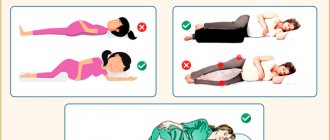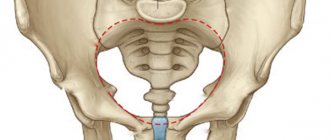Pregnancy is a wonderful period in a woman’s life. But with the onset of pregnancy, discomfort and pain in the body appear. The reason is hormonal changes in the body of the expectant mother, the body is preparing for childbirth. Pregnant women often experience pain, and their hips hurt at night.
When carrying a child, pain in the hip may occur during movement and during rest. The pain is short-term, acute and long-term. Pain often appears at night, during sleep. The woman does not get enough sleep and wakes up with pain in her lower extremities.
Healthy sleep during pregnancy
Causes of back pain at night and after sleep
After a hard, stressful and worry-filled day at work, we look forward to the night. After all, during sleep, our body rests, gains strength, and all muscles and joints relax. But it is impossible to fully rest if your back hurts in the morning after sleep. This causes severe discomfort, a feeling of weakness and fatigue, and the desire to get out of bed and actively spend a new day disappears. Why does this happen? Among the reasons for this phenomenon, one can distinguish factors not related to the disease and those caused by the disease. Let's take a closer look at both of them.
Causes of back pain after sleep that are easy to eliminate
This includes all those reasons that are physiological, that is, not associated with any pathology and do not pose a threat to health if they are eliminated in time. Otherwise, they can act as risk factors for the development of spinal diseases and back pain will become chronic. Let's look at the most common reasons why your back starts to hurt in the morning.
Incorrect and irrational position in bed
A person spends a third of his life in a state of sleep, so it is very important that during these hours the body takes exactly the position in which all muscles are relaxed and the spine takes a physiological position. There are 3 main sleeping positions:
Let’s say right away that for the health of the spine and the prevention of back pain, you need to sleep on your side. This position ensures that all segments of the spine are on the same line, complete relaxation of the muscles of the back, limbs and pelvic girdle, maximum unloading of the spinal discs, and good blood circulation through the arteries.
Many people choose to sleep on their side, even those who already suffer from pain in the lower back or other parts of the spinal column. This pose also helps to cope with snoring. It is not recommended for people with heart disease to sleep on their left side.
Sleeping on your stomach is not physiological, despite this, a large number of people sleep this way. This position contributes to overstrain of the back muscles, especially the lumbar region. In addition, when sleeping on our stomachs, we turn our heads to the side, which causes difficulty in blood flow through the vertebral arteries. In this case, every morning we can feel not only pain in the back, but also in the head. It is also not recommended for people with respiratory problems to sleep on their stomach (the chest is compressed); this position is also not recommended by cosmetologists due to the increased risk of wrinkles.
Sleeping on your back is also not considered optimal. It is a misconception that in the supine position all the back muscles relax; on the contrary, a large number of them are in a spasmodic state. It is also prohibited for people who suffer from snoring and apnea to sleep on their backs.
Important! Changing a sleeping position is very difficult, because it depends not only on a person’s desires, but also on character, external conditions, and habits. Therefore, it is difficult to develop the necessary habit, but under no circumstances should you give up.
Wrong mattress
The reason why your back hurts in the morning may be the wrong mattress and some other sleeping accessories, such as a pillow. Ideal if you sleep on an orthopedic product. A mattress that is too soft or hard leads to bending of the spinal column, which is accompanied by overstrain of certain muscle groups, which is why pain develops in the morning.
Sleeping accessories
If the bed linen is made from synthetic fabrics, then during sleep, when the body rubs against the fabric, minimal electrical charges may arise, which lead to involuntary contractions of muscle fibers. This can also cause back pain in the morning.
Physical fatigue the day before
Any hard or unusual physical work can affect how you feel the next day. Under-oxidized metabolic products accumulate in the muscles, in particular lactic and pyruvic acids, which cause pain not only in the back, but also in all other parts of the body. This pain disappears throughout the day.
Everyone can identify all the above reasons on their own and take the necessary measures to eliminate them. But if your back hurts severely every day, you should look for a more serious cause and be sure to undergo a medical examination.
Serious reasons
If your back hurts at night, and not after sleep, and prevents you from getting a good night's sleep, then most likely the reason is much more serious than an uncomfortable mattress. There are 2 groups of diseases that can be accompanied by the following symptoms:
- spine pathology,
- diseases of internal organs.
The most common cause of back pain after sleep is degenerative-dystrophic diseases of the spinal column:
- osteochondrosis,
- spondylosis,
- spondyloarthrosis,
- spondylolisthesis,
- prolapse and herniated disc.
Also, back pain at night and after sleep can occur due to acquired or congenital deformities of the spine, poor posture, osteoporosis and its consequences (compression fractures of the vertebrae), systemic connective tissue diseases involving the vertebral joints.
In the latter case, it is worth noting such an ailment as ankylosing spondylitis or ankylosing spondylitis. This is a chronic progressive systemic inflammatory disease of connective tissue that mainly affects the spinal joints and paravertebral soft tissues. Pathology develops at the age of 30-40 years, and in men 5 times more often than in women.
A characteristic symptom of ankylosing spondylitis at an early stage, that is, before the formation of typical deformities of the spinal column, is pain that occurs in the sacrum and lumbar region, intensifies at night and in the morning, preventing the patient from falling asleep. The pain is accompanied by stiffness in the affected areas and limited mobility. Pain sensations decrease during wakefulness and active movements.
As the disease progresses, the pain intensifies and spreads to other areas of the spine. Stiffness increases, curvatures and deformities of the spine begin to form. The prognosis of the pathology is unfavorable. Over time, the patient completely loses the ability to move the spine, and its deformation leads to disability and permanent loss of ability to work. Unfortunately, all existing treatment methods can only temporarily delay such a sad outcome.
Among the diseases of internal organs that can manifest as back pain after sleep, the following should be noted:
- pathology of the kidneys and urinary tract;
- diseases of the peripheral nervous system;
- ailments of the cardiovascular system, lungs, liver, pancreas;
- gynecological diseases;
- tumor lesions.
An accurate diagnosis can be established only after consulting a doctor and a series of additional examinations.
How to get rid of back pain at night
First you need to determine whether the pain is caused by physiological reasons or some kind of disease. To do this, conduct a thorough audit of your sleeping place. Evaluate the quality of the mattress, pillows, and bed linen fabric. Next, you need to study your posture outside (relatives can help with this) and your occupation; perhaps there are factors in your lifestyle that cause overstrain of the muscles of the back and spinal column.
If negative factors have been identified, they should be eliminated immediately (replace the mattress, bed linen, try to acquire a physiological posture during sleep, eliminate overstrain of the back muscles during the working day). If it is not possible to associate the symptoms that occur with certain risk factors, you should consult a doctor to look for medical causes of back pain.
What to do if your legs go numb
First you need to make as many movements as possible. You can sign up for yoga or fitness for pregnant women. There is no physical activity in the above places, but constant movement is ensured. If your condition does not allow you to visit such establishments, then you can simply go for a walk as often as possible, and also regularly do physical exercises for pregnant women (there are many videos with exercises on the Internet).
You can try to prevent numbness in your limbs by following these tips:
- It is necessary to drink liquid in sufficient quantity, at least 1-1.5 liters of clean water per day, other drinks do not count;
- complete avoidance of heels and restrictive clothing during pregnancy;
- if the work involves stress on the arm, you need to take a break every hour, allowing your arms and legs to relax;
- if numbness occurs at night, you can ask your husband to massage the problem area;
- when sleeping, only your head should be on the pillow and your shoulders should be on the bed, this will reduce the load on the cervical spine;
- Ideally, you should use orthopedic pillows for sleeping, and place bolsters or small pillows between your knees or under your large tummy.
Since the main causes are osteochondrosis, arthrosis and similar diseases, it is necessary to constantly disperse the blood in the organs. Movement, in itself, is the prevention of those same diseases. Gymnastics and massage will also have a positive effect on your overall health.
Numbness or hypoesthesia is a condition characterized by decreased sensitivity to stimuli. It begins with a sensation of pins and needles on the soles of your feet. Numbness is often diagnosed in expectant mothers.
The cause of numbness in the legs is a malfunction of the central nervous system (CNS) or poor circulation. Often, unpleasant sensations develop due to compression of nerve endings or blood vessels.
Numbness of the legs during pregnancy
Doctors identify the following causes of numbness of the limbs during pregnancy:
- Increased load on the legs. Pregnant women quickly gain weight from the second trimester, which increases the load on the spinal column and large vessels of the legs. In late pregnancy, women find it difficult to walk;
- Physical inactivity – decreased mobility. During pregnancy, the belly grows and it becomes difficult for a woman to move. Therefore, the expectant mother does not change her body position for a long time or performs the same type of actions, which leads to stagnation of lymph in the legs and their numbness;
- Edema. Changes in hormone levels during pregnancy lead to fluid accumulation and swelling. This provokes compression of nerve endings and blood vessels and a decrease in sensitivity;
- Uncomfortable position while sleeping. At night, women do not control their body position, which leads to compression of veins and nerves;
- Varicose veins, chronic venous insufficiency, hypoesthesia is caused by hormonal changes during pregnancy, weight gain, and increased blood flow;
- Lack of vitamins and microelements. A nutritious diet cannot provide adequate levels of nutrients. A large amount of calcium from the mother’s body is used to form the fetal skeleton. And a lack of calcium leads to muscle spasms, compression of nerves and numbness in the legs. Magnesium deficiency causes disturbances in the functioning of the central nervous system - a failure in the transmission of nerve impulses occurs, abnormal muscle contraction develops and a feeling of numbness develops. A lack of B vitamins leads to damage to nerve cells, causing the sensation of pins and needles on the toes;
- Preparing the body for childbirth. Some women at 37 weeks of pregnancy complain of thigh numbness. This is due to the divergence of the pelvic bones and stretching of the muscles of the lower abdomen.
Causes of numbness of the lower extremities during pregnancy
However, the occurrence of numbness in the legs may be a symptom of a serious illness that develops latently during pregnancy:
- Diseases of the musculoskeletal system. Osteochondrosis is characterized by various symptoms: numbness of the limbs, pain in the lower back and sacrum. Diseases of the lumbar region are accompanied by a feeling of numbness in the lower extremities from the fingers to the thigh. Numbness in the feet and legs may indicate a herniated disc. Rheumatoid arthritis is accompanied by numbness of the fingers and feet;
- Diabetes mellitus, which is also characterized by numbness in the legs;
- Predisposition to heart attack. In this case, only the left leg and arm become numb;
- Diseases of the kidneys and urinary system.
If numbness in the lower extremities is associated with a systemic disease, the help of a qualified physician will be required. Since the complications that arise can disrupt the functioning of all organs and systems of the body.
During pregnancy, the right limb often goes numb. This is due to the fact that hormonal changes in the body gradually provoke softening of tendons and relaxation of ligaments in order to expand the birth canal for the child.
This process affects all connective tissues in the body and can cause pinched nerves, causing swelling, which causes numbness. At the same time, the hand, shoulder, neck and even head hurt.
In addition, this condition can be provoked by wearing clothes:
- narrow sleeves;
- compression cuffs;
- carrying a bag on the shoulder.
All this contributes to compression of the nerve located in the shoulder joint, causing discomfort.
In the last months of bearing a baby, numbness in the hands at night occurs from behind the back. Typically, this problem is due to the fact that the uterus increases in size and can pinch a nerve. This condition rarely occurs. However, if this is the reason, you need to visit a neurologist. The doctor will select safe medications and give appropriate recommendations.
What causes discomfort in the left limb? The left side is associated with the work of the heart muscle. Therefore, if you feel pain in this side, and it gives off a tingling sensation in the heart, then you should immediately consult a doctor. The woman may need additional examinations.
Sometimes women complain that their legs go numb while sleeping during pregnancy. This condition sometimes manifests itself in the early stages, but more often in the last months of pregnancy. As a rule, the thighs become numb at night due to an incorrect sleeping position.
As a result, blood circulation is disrupted, since blood vessels are compressed. To fix the problem, just take a comfortable position.
At the same time, if the thigh and leg become numb, and there are accompanying negative symptoms, you should immediately visit a neurologist. He will determine the cause of the disorder and prescribe therapy. You may need to take sedatives, painkillers, anti-inflammatory drugs and topical warming ointments for compresses on the thighs.
Hips hurt during pregnancy while sleeping
Pregnancy is a wonderful period in a woman’s life. But with the onset of pregnancy, discomfort and pain in the body appear. The reason is hormonal changes in the body of the expectant mother, the body is preparing for childbirth. Pregnant women often experience pain, and their hips hurt at night.
When carrying a child, pain in the hip may occur during movement and during rest. The pain is short-term, acute and long-term. Pain often appears at night, during sleep. The woman does not get enough sleep and wakes up with pain in her lower extremities.
HOW TO GET RID OF PATHOLOGY
To eliminate hand numbness during pregnancy during sleep, it is important to know the cause.
Therapy is prescribed according to the diagnosis:
- Micronutrient deficiency. You need to take a vitamin course.
- To improve nerve conduction, homeopathic medicines are required.
- When a chronic disease has worsened, it is important to neutralize the autoimmune pathology. Numbness in the hands is caused by problems in the functioning of the heart muscles, injuries, and disruptions in the circulatory system. After completing a course of treatment for these diseases, numbness in the hands no longer occurs.
When numbness of the limbs during sleep is accompanied by other diseases, therapy is prescribed by a neurologist and rheumatologist.
Types of hip pain
Pain is classified according to the following characteristics:
- Pain appears due to physical activity, disappears after rest - mechanical type of pain. Distribute the load moderately;
- Pain appears when moving, then disappears - starting pain;
- Pain in the thigh occurs at night and is absent during the day. Type of pain – nocturnal;
- During pregnancy, concomitant diseases of the organs that radiate pain to the hip area - referred pain;
- Localization of hip pain at night;
When finding out the cause and looking for a treatment method, pay attention to the location of the pain:
- When there is pain on the inner thighs, the body signals that it is preparing for childbirth. Pain occurs due to divergence of the pelvic bones, sprained ligaments and muscles;
- Pain appears in the thigh area close to the buttock muscles - due to inflammation of the sciatic nerve;
- Painful sensations are localized in the pubic bone - this is symphysitis.
It is difficult to diagnose pain in the hips. If you experience pain in the hip, notify the observing gynecologist, who will find out the causes and select a treatment method.
Causes of pain at night
Why does hip pain occur at night, preventing you from resting? A common cause is a strained hip muscle. The body releases hormones that increase the mobility of the joints, pelvis and hips to make the upcoming birth easier. Pain in the thigh muscles during sleep lasts until childbirth. The condition is called pubic dehiscence.
When the sciatic nerve becomes inflamed, pain occurs in the pelvic and thigh areas. Inflammation occurs due to the increasing load on the uterus of the musculoskeletal system. This brings constant discomfort. When the sciatic nerve becomes inflamed, a burning and tingling sensation occurs in the thigh area.
Causes of muscle pain in the hips:
- Sedentary, sedentary pastime. With moderate physical activity before pregnancy, the ligaments and muscles of the hip and pelvis are strengthened. If the expectant mother led an inactive lifestyle, the muscles are weakened. Pain in the muscles and hip joints appears during the daytime and at night;
- If the expectant mother has a history of musculoskeletal diseases, the risk of hip pain increases;
- Lack of calcium and fluoride in the body of the expectant mother;
POSSIBLE COMPLICATIONS
Numbness of the hands during pregnancy during sleep is often a benign functional condition and does not cause any complications. If the problem is permanent, consequences occur, depending on the specific diseases.
- Vitamin deficiency. When the lack of beneficial microelements increases, cardiac function is disrupted.
- If the cause of numbness in the hands during sleep is a neurological disease, it is necessary to carry out therapy in order to avoid negative consequences in the form of impaired sensitivity and motor function.
- Osteochondrosis is fraught with complications in the form of disruptions in the innervation of internal organs and somatic diseases.
- Carpal tunnel syndrome causes swelling of the wrist tendons, pinching of the median nerve, complete loss of mobility of the thumb, and atrophy of its muscles.
- Thrombosis is dangerous due to the spread of numbness, necrosis of muscle tissue, detachment of a blood clot, and death.
- Vascular, rheumatic diseases, Raynaud's syndrome in severe form lead to blue fingers and gangrene.
If you do not treat regular hand numbness during sleep, the limbs usually lose full motor function.
Text author: Ruslana FEDOROVA
Treatment for nighttime hip pain
Treatment is prescribed by a doctor. Physiotherapy and painkillers are prescribed. If pain appears in the hip area at night, to improve the condition and reduce pain, a pregnant woman should perform a set of gymnastics to strengthen the muscles of the hip joint. Lifting weights and a sedentary lifestyle are contraindicated - the condition worsens and pain in the hip increases.
If there is inflammation inside the hip joint, an ice compress will help reduce pain in the hip muscles. Pregnant women need to maintain correct posture when moving, otherwise the load on the muscles and joints of the hip joint increases. Wearing a bandage reduces the load on the pelvic muscles. Relieves excess stress and reduces the development of pain in the legs. A foot massage will help relieve pain in the hips at night, improve the circulation of oxygen in the blood, and help heal damaged muscle tissue faster.
Changing positions helps with hip pain while sleeping. The joints and muscles of the hip joints must be supported. Lie on your side, bend your lower limbs at the knees. Place a pillow between your legs. Use a pillow or blanket to support your back. With your doctor's approval, apply warm compresses or a heating pad to the thigh area.
Gymnastics is a way to reduce pain
Exercising helps relieve thigh muscle pain. Reduce muscle tension, normalize sensitivity, and minimize pain. It is advisable to perform gymnastics daily. Exercises to reduce pain in the thigh muscles include stretching the pectoral muscles, bending the body in different directions, and circular rotations of the small pelvis. The complex strengthens muscle tone, relieves discomfort and fatigue.
To reduce hip pain at night, perform daily hip-strengthening exercises. Jumping and sudden movements are contraindicated during pregnancy. Movements should be smooth and careful. Gymnastics time is up to 10 minutes. Before starting therapeutic exercises, consult your doctor.
Exercises to strengthen the thigh muscles:
- To maintain normal tone in the muscles of the lower extremities, plie squats are performed. Standing position, legs wide apart. The feet are spread outward. The arms are extended forward, palms down. Legs bend at the knees. The exercise is performed 10-15 times;
- Stretching will help strengthen your thigh muscles. Kneeling position, hands on shoulders. The right leg slowly straightens, the left arm too. The exercise is performed 5 times per leg;
- Standing position on all fours. The left leg is straightened, placed behind, resting the toes on the floor. Raise your leg to hip height. The exercise is performed 15 times, then done with the right foot;
- Lying position on the right side. The left leg is extended straight, the right leg is bent. Pull out, pulling the sock towards you. The exercise is repeated 15 times;
- Standing position, facing the wall. The forearms rest on the wall and the forehead rests on them. The back is straight. The knee of the left leg is bent, placed close to the wall, the heels rest on the floor. The right leg and back are in one straight line. Knee against the wall, pulled towards the wall as far as possible. Fix the position for a couple of seconds, return to the original position. The exercise is performed several times;
- Sitting position on the floor, legs in front of you, feet pressed together. The body is tilted forward. Pull your knees down with the muscles of your lower extremities. The exercise is performed smoothly, without sudden movements.
Preventing hip pain
Preventive measures against hip pain:
- It is prohibited to lift heavy objects during pregnancy.
- Do exercises every day, attend courses for pregnant women that provide therapeutic exercises.
- Maintain correct posture when walking and moving.
- Avoid uncomfortable shoes.
- Take prenatal vitamins as prescribed by your doctor.
- Wear a bandage that reduces stress on the pelvic and thigh muscles.
- Do not sleep on your back, excluding pressure on the spine.
- If you have pain in your hip, walk around, do something useful, take a break.
- A remedy for preventing muscle pain is swimming in the pool, special yoga for pregnant women.
When hip pain during sleep occurs due to the body’s natural preparation for childbirth, endure such pain. This pain will go away after childbirth.
FOLK METHOD OF COMBATING NUMBITY
Unconventional methods of eliminating numbness of the upper extremities during sleep are widely used. Below are the most popular folk remedies.
- Pumpkin gruel. The vegetable is crushed in a blender and squeezed with a bandage. The resulting mass is applied to hands suffering from numbness 2 times a day. You can cover the top with gauze.
- Squeeze the juice of lemon and parsley, coat the upper limbs with it 2-3 times a day, always before bed.
- Tincture of honey and flaxseed oil. Take 3 tbsp. bee nectar, mixed with 5 drops of linseed oil, 3 tbsp. water. Take 1 tsp orally. 3 times a day.
- Product based on eggshells. Wash it and grind it into powder with a mortar. Add 3 drops of lemon nectar to the mixture. When the mixture is saturated with juice, take it orally every day 1-2 times a day, 1 tsp. The last dose should be before bedtime.
- Add warm milk, sea salt, honey to the bath. Keep your hands in it for half an hour before going to bed.
After using the above recipes, not only numbness in the hands is eliminated, but also overall well-being improves, and sleep becomes sound.
Attention! You can resort to traditional methods only after consulting a doctor in order to exclude a possible allergy to the components in the recipe.
During pregnancy, your sides hurt when you sleep
How to sleep properly during pregnancy? Pregnancy affects many organs and functions of your body, including sleep, which can become irregular and difficult during the entire nine months of your pregnancy.
For those women who like to sleep or are very light sleepers, sleep can be a very unpleasant problem. Especially considering the fact that in the first trimester you want to sleep almost constantly, and in the third it is very inconvenient - your already well-grown tummy makes it difficult to find a comfortable sleeping position.
What organs are located on the right side of the abdomen?
What can hurt on the right side? In diagnosing the problem, it is very important to understand where exactly the pain is localized.
To do this, let’s divide the right side of the abdomen into the upper and lower halves:
- At the top are: liver, bile ducts, gallbladder, intestines, stomach and diaphragm, kidney, duodenum, pancreas;
- in the lower – ureter, fallopian tubes, appendix, ovary with appendage, small and large intestines;
Pregnancy leads to changes in the functioning of almost all organs. Their activity weakens, blood circulation is impaired, and immune status decreases. The result is an exacerbation of chronic diseases and the emergence of new problems that have never bothered a woman before.
How to sleep during pregnancy?
First months
Early in your pregnancy, you may feel an uncontrollable urge to sleep at any time of the day. This is quite normal, and is explained by the fact that serious hormonal changes are occurring in your body.
This sleepy state creates a number of difficulties, especially during work. Don't worry - usually by the end of the third month the drowsiness will disappear. And don’t resist your body’s needs – try to get more rest.
Some women experience anxiety early in pregnancy, which can cause insomnia. Expecting a child for a pregnant woman is also associated with psychological changes. Fear appears for the baby’s life, fear of future motherhood. This is quite normal and, most likely, all worries will subside when you see your unborn baby at the first screening ultrasound.
Don't forget about the widespread problem of the first trimester - nausea. Some women even experience unpleasant sensations at night that interfere with sleep.
Last months
Starting from the sixth month, you will find it increasingly difficult to find a comfortable sleeping position. Perhaps you have begun to experience cramps and have unpleasant, restless dreams. You may be awakened by your child's movements - after all, he has his own sleep and wakefulness schedule, and nothing can be done about it. All these factors can lead to insomnia. If you wake up with pain from leg cramps, massage the offending muscle as long as possible by stretching your leg. You can also place a pillow under your feet. If the pain bothers you greatly, you should consult a doctor - perhaps you are lacking vitamins. If you still have trouble falling asleep, your doctor may prescribe calming herbs or a mild sleeping pill.
Relax
Try doing an exercise that may help you sleep. Lie on your back and close your eyes. Try to concentrate on your breathing. Stretch your neck, pressing your chin to your chest and lowering your shoulders. To feel the rhythm of your breathing, place your palms on your lower abdomen. Exhale slowly and longly and inhale freely. Lie on your side with your knees bent and one pillow under your head and one between your legs, or use a pregnancy pillow. Continue to monitor your breathing, relaxing your body with each exhalation. Try to relax the muscles of your neck, face and arms so that your eyelids become heavy. You'll probably fall asleep.
Is it possible to sleep on your stomach during pregnancy?
Women who are used to sleeping on their stomachs will have to give up their usual position.
In the early stages of pregnancy, while the uterus is still below the level of the pubic bone, you can sleep in any position, including on your stomach. But later, when the stomach begins to enlarge, sleeping on the stomach will become impossible. Most likely, you will have to change your sleeping position even earlier, since enlarged mammary glands can become quite painful when touched and squeezed. Sleeping on your stomach will become simply impossible already in the second trimester, because the enlarged belly will not allow you to lie down comfortably in your usual position. In addition, pressure on the fetus in this position is very dangerous.
Allowed sleeping positions during pregnancy
During pregnancy, women should sleep on their side. Moreover, the position on the left side will help you avoid pressure on the vena cava, which runs to the right of the uterus, which returns blood from the lower part of the body to the heart, and on the right it will help relieve the load on the kidneys. For comfort, you can place a pillow under your knee or a folded blanket between your legs. It's great if you have a special pregnancy pillow that allows you to take a comfortable position, provides good support for your tummy while you sleep, and prevents expectant mothers from rolling over into the wrong position while sleeping. Don't worry if it's not very comfortable at first: your body will adapt to this position.
Among other things, pregnant women need to care not only about what position to sleep in, but also how to get out of bed. First you need to turn on your side, and only then take a sitting position. This way you will avoid unwanted uterine tone.
How to get enough sleep: tips for pregnant women
So how to get enough sleep during this difficult period of your life? There are a few tips to help you adjust:
Learn to sleep on your side with your knees bent . This position is usually favorable for sleeping in your position. Doctors also note that it is better to sleep on the left side - this improves blood circulation and reduces pressure on such an important organ as the liver. Don't worry if you roll over onto your back while sleeping - this is natural. In the third trimester of pregnancy, you are unlikely to be able to do this, because it will be very uncomfortable. It is during this period that doctors recommend purchasing a pregnancy pillow that would support your body and already quite rounded belly.
Do not overeat or drink strong tea, coffee, juices or other drinks containing caffeine before bed. Drink lukewarm water or milk. Do not overdo it with herbal infusions; you need to be careful here, because not all herbs are recommended for pregnant women. Herbal teas do not contain caffeine and enrich the body with vitamins and microelements. Typically, pregnant women can drink tea made from mint, lemon balm, and chamomile. These plants promote relaxation - just what you need before bed. However, before use, you should consult your doctor.
Try to go to bed and wake up at the same time. After a few days, your body’s “clock” will adjust and by the right time you will already be sleepy.
Before going to bed, you can take a 15-minute warm foot bath .
During the day, you can attend special fitness classes or yoga for pregnant women (be sure to consult your doctor regarding physical activity). The company of women in the same position as you will support you and give you strength.
There may be a time when you simply cannot sleep, and no advice will help. The only thing you shouldn’t do is toss around in bed all night, not letting either yourself or your husband sleep. Better do something useful , for example, read a book, listen to your favorite music, embroider, bake cookies. Eventually you will feel tired and fall asleep within seconds.
Causes of back pain at night and after sleep
After a hard, stressful and worry-filled day at work, we look forward to the night. After all, during sleep, our body rests, gains strength, and all muscles and joints relax. But it is impossible to fully rest if your back hurts in the morning after sleep. This causes severe discomfort, a feeling of weakness and fatigue, and the desire to get out of bed and actively spend a new day disappears. Why does this happen? Among the reasons for this phenomenon, one can distinguish factors not related to the disease and those caused by the disease. Let's take a closer look at both of them.
Causes of back pain after sleep that are easy to eliminate
This includes all those reasons that are physiological, that is, not associated with any pathology and do not pose a threat to health if they are eliminated in time. Otherwise, they can act as risk factors for the development of spinal diseases and back pain will become chronic. Let's look at the most common reasons why your back starts to hurt in the morning.
Incorrect and irrational position in bed
A person spends a third of his life in a state of sleep, so it is very important that during these hours the body takes exactly the position in which all muscles are relaxed and the spine takes a physiological position. There are 3 main sleeping positions:
Let’s say right away that for the health of the spine and the prevention of back pain, you need to sleep on your side. This position ensures that all segments of the spine are on the same line, complete relaxation of the muscles of the back, limbs and pelvic girdle, maximum unloading of the spinal discs, and good blood circulation through the arteries.
Many people choose to sleep on their side, even those who already suffer from pain in the lower back or other parts of the spinal column. This pose also helps to cope with snoring. It is not recommended for people with heart disease to sleep on their left side.
Sleeping on your stomach is not physiological, despite this, a large number of people sleep this way. This position contributes to overstrain of the back muscles, especially the lumbar region. In addition, when sleeping on our stomachs, we turn our heads to the side, which causes difficulty in blood flow through the vertebral arteries. In this case, every morning we can feel not only pain in the back, but also in the head. It is also not recommended for people with respiratory problems to sleep on their stomach (the chest is compressed); this position is also not recommended by cosmetologists due to the increased risk of wrinkles.
Sleeping on your back is also not considered optimal. It is a misconception that in the supine position all the back muscles relax; on the contrary, a large number of them are in a spasmodic state. It is also prohibited for people who suffer from snoring and apnea to sleep on their backs.
Important! Changing a sleeping position is very difficult, because it depends not only on a person’s desires, but also on character, external conditions, and habits. Therefore, it is difficult to develop the necessary habit, but under no circumstances should you give up.
Wrong mattress
The reason why your back hurts in the morning may be the wrong mattress and some other sleeping accessories, such as a pillow. Ideal if you sleep on an orthopedic product. A mattress that is too soft or hard leads to bending of the spinal column, which is accompanied by overstrain of certain muscle groups, which is why pain develops in the morning.
Sleeping accessories
If the bed linen is made from synthetic fabrics, then during sleep, when the body rubs against the fabric, minimal electrical charges may arise, which lead to involuntary contractions of muscle fibers. This can also cause back pain in the morning.
PREVENTIVE ACTIONS
You can get rid of hand numbness during sleep or prevent its occurrence with the help of preventive measures. They should be resorted to at the first manifestations of paresthesia, throughout the entire perinatal period.
- Control the load. Pregnant women are prohibited from spending a lot of time at the computer or leading a passive lifestyle. If this cannot be avoided, you should dose the loads and do light exercises every 2 hours.
- Limit fluid intake. From the second trimester, it is important to avoid excessive water consumption. The kidneys already function as two people, and when they cannot cope with the load, swelling, late toxicosis, shortness of breath, and numbness of the upper extremities occur. It is acceptable to drink 8 glasses of water a day, starting from the 2nd trimester. Before going to bed, you should not drink a lot of liquid, otherwise you will not avoid swelling.
- Proper nutrition. Numbness of the hands can occur due to vitamin deficiency, mineral deficiency, or excess weight. You can control these aspects with a properly composed food menu. The diet should include fresh fruits and vegetables every day. In the off-season, multivitamins are additionally prescribed. A woman should receive a normal amount of iron and calcium, since anemia often causes limbs to go numb.
- Disease prevention. If you have chronic diseases, it is advisable to undergo treatment 2-3 months before conception. If pregnancy has already occurred, in order to prevent exacerbations of pathologies and the emergence of new diseases, you should avoid visiting crowded places during epidemics.
- Physical activity. Moderate exercise increases immunity, improves health, maintains muscle tone throughout the body, normalizes heart function, and trains blood vessels. During sports, blood circulation increases and paresthesia is prevented. If there is a risk of premature birth or miscarriage, sports are contraindicated. Then you need to take a walk in the fresh air every day.
- Sleep 8 hours a day. Sometimes numbness in the hands occurs due to fatigue. Proper rest is important for pregnant women. Night sleep is preferable, since during the daytime rest, strength is less restored.
- Avoid wearing clothes that squeeze your arms. During pregnancy, body weight often increases; it is worth wearing clothes that fit. Products that fit tightly can pinch arteries, cause numbness in the hands during sleep, and cause discomfort.
Doctors recommend choosing an elastic, moderately hard mattress that can support the spinal column and prevent the body from sinking during sleep. Take a pillow that is not too high so that the neck does not become numb and numbness does not spread to the upper limbs.










